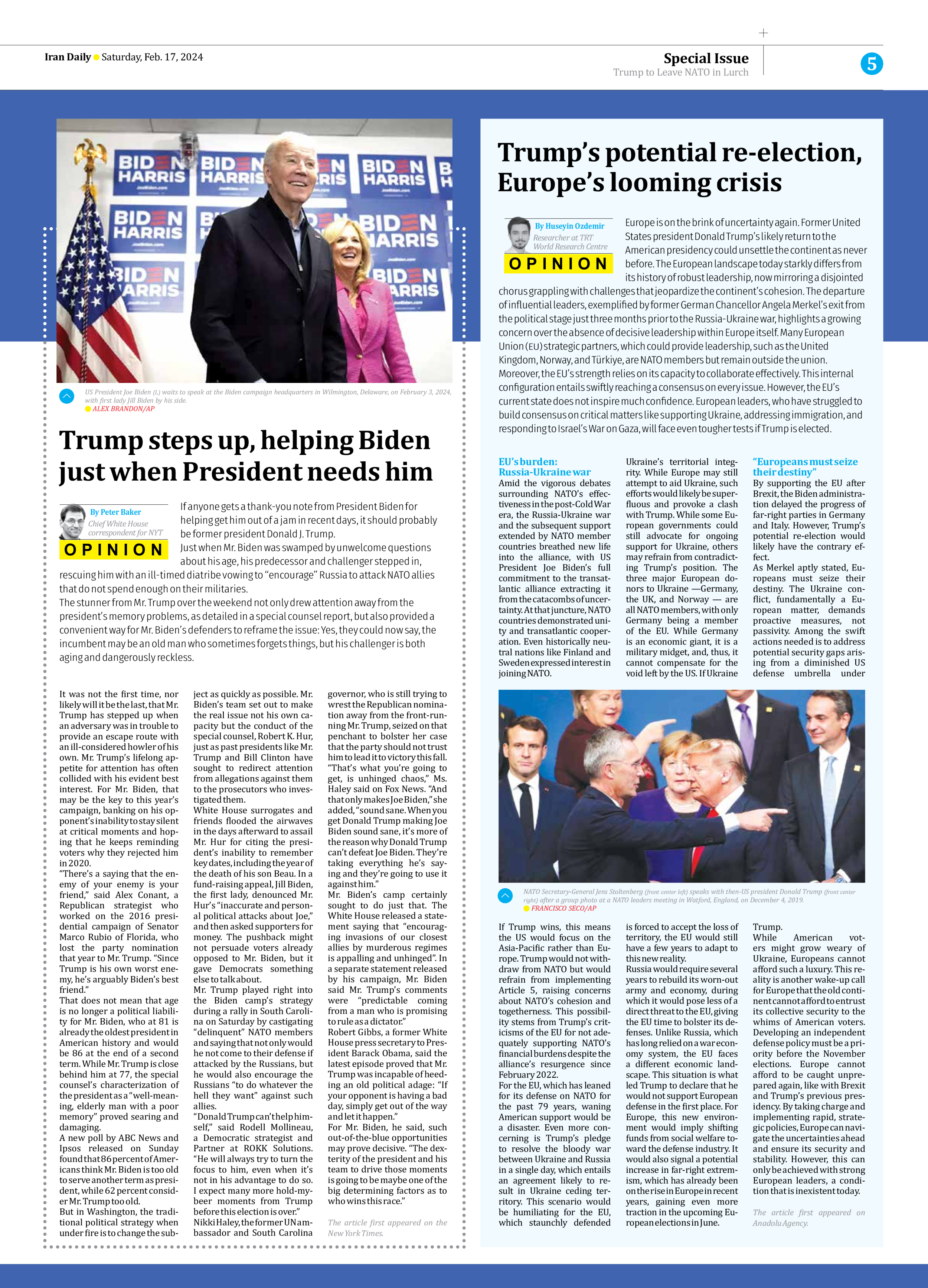
Trump’s potential re-election, Europe’s looming crisis
By Huseyin Ozdemir
Researcher at TRT World Research Centre
Europe is on the brink of uncertainty again. Former United States president Donald Trump’s likely return to the American presidency could unsettle the continent as never before. The European landscape today starkly differs from its history of robust leadership, now mirroring a disjointed chorus grappling with challenges that jeopardize the continent’s cohesion. The departure of influential leaders, exemplified by former German Chancellor Angela Merkel’s exit from the political stage just three months prior to the Russia-Ukraine war, highlights a growing concern over the absence of decisive leadership within Europe itself. Many European Union (EU) strategic partners, which could provide leadership, such as the United Kingdom, Norway, and Türkiye, are NATO members but remain outside the union.
Moreover, the EU’s strength relies on its capacity to collaborate effectively. This internal configuration entails swiftly reaching a consensus on every issue. However, the EU’s current state does not inspire much confidence. European leaders, who have struggled to build consensus on critical matters like supporting Ukraine, addressing immigration, and responding to Israel’s War on Gaza, will face even tougher tests if Trump is elected.
EU’s burden: Russia-Ukraine war
Amid the vigorous debates surrounding NATO’s effectiveness in the post-Cold War era, the Russia-Ukraine war and the subsequent support extended by NATO member countries breathed new life into the alliance, with US President Joe Biden’s full commitment to the transatlantic alliance extracting it from the catacombs of uncertainty. At that juncture, NATO countries demonstrated unity and transatlantic cooperation. Even historically neutral nations like Finland and Sweden expressed interest in joining NATO.
If Trump wins, this means the US would focus on the Asia-Pacific rather than Europe. Trump would not withdraw from NATO but would refrain from implementing Article 5, raising concerns about NATO’s cohesion and togetherness. This possibility stems from Trump’s criticisms of the EU for not adequately supporting NATO’s financial burdens despite the alliance’s resurgence since February 2022.
For the EU, which has leaned for its defense on NATO for the past 79 years, waning American support would be a disaster. Even more concerning is Trump’s pledge to resolve the bloody war between Ukraine and Russia in a single day, which entails an agreement likely to result in Ukraine ceding territory. This scenario would be humiliating for the EU, which staunchly defended Ukraine’s territorial integrity. While Europe may still attempt to aid Ukraine, such efforts would likely be superfluous and provoke a clash with Trump. While some European governments could still advocate for ongoing support for Ukraine, others may refrain from contradicting Trump’s position. The three major European donors to Ukraine —Germany, the UK, and Norway — are all NATO members, with only Germany being a member of the EU. While Germany is an economic giant, it is a military midget, and, thus, it cannot compensate for the void left by the US. If Ukraine is forced to accept the loss of territory, the EU would still have a few years to adapt to this new reality.
Russia would require several years to rebuild its worn-out army and economy, during which it would pose less of a direct threat to the EU, giving the EU time to bolster its defenses. Unlike Russia, which has long relied on a war economy system, the EU faces a different economic landscape. This situation is what led Trump to declare that he would not support European defense in the first place. For Europe, this new environment would imply shifting funds from social welfare toward the defense industry. It would also signal a potential increase in far-right extremism, which has already been on the rise in Europe in recent years, gaining even more traction in the upcoming European elections in June.
“Europeans must seize their destiny”
By supporting the EU after Brexit, the Biden administration delayed the progress of far-right parties in Germany and Italy. However, Trump’s potential re-election would likely have the contrary effect.
As Merkel aptly stated, Europeans must seize their destiny. The Ukraine conflict, fundamentally a European matter, demands proactive measures, not passivity. Among the swift actions needed is to address potential security gaps arising from a diminished US defense umbrella under Trump.
While American voters might grow weary of Ukraine, Europeans cannot afford such a luxury. This reality is another wake-up call for Europe that the old continent cannot afford to entrust its collective security to the whims of American voters. Developing an independent defense policy must be a priority before the November elections. Europe cannot afford to be caught unprepared again, like with Brexit and Trump’s previous presidency. By taking charge and implementing rapid, strategic policies, Europe can navigate the uncertainties ahead and ensure its security and stability. However, this can only be achieved with strong European leaders, a condition that is inexistent today.
The article first appeared on Anadolu Agency.







